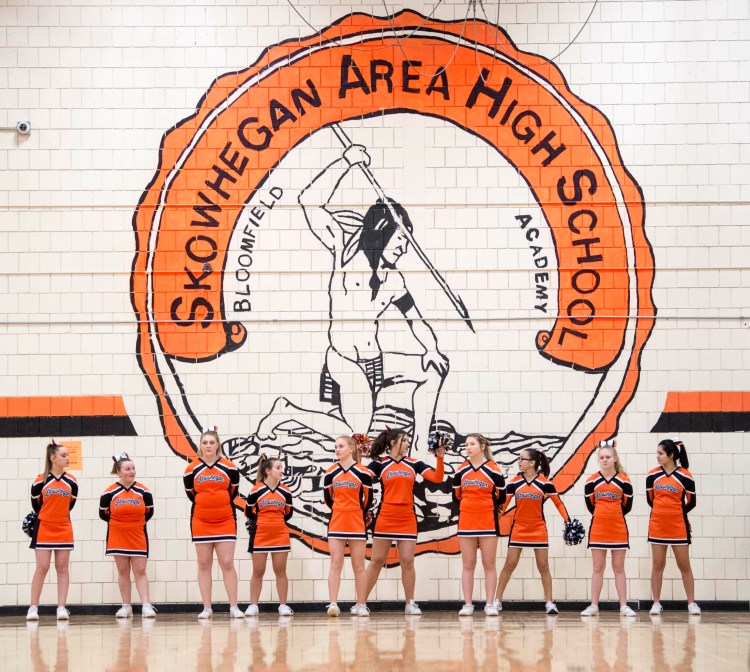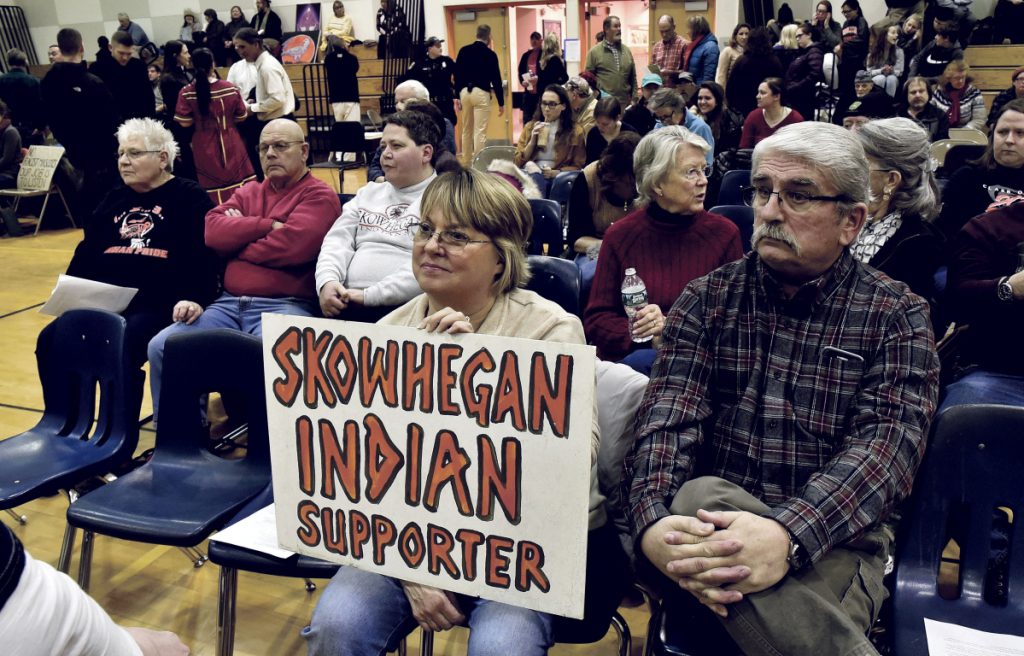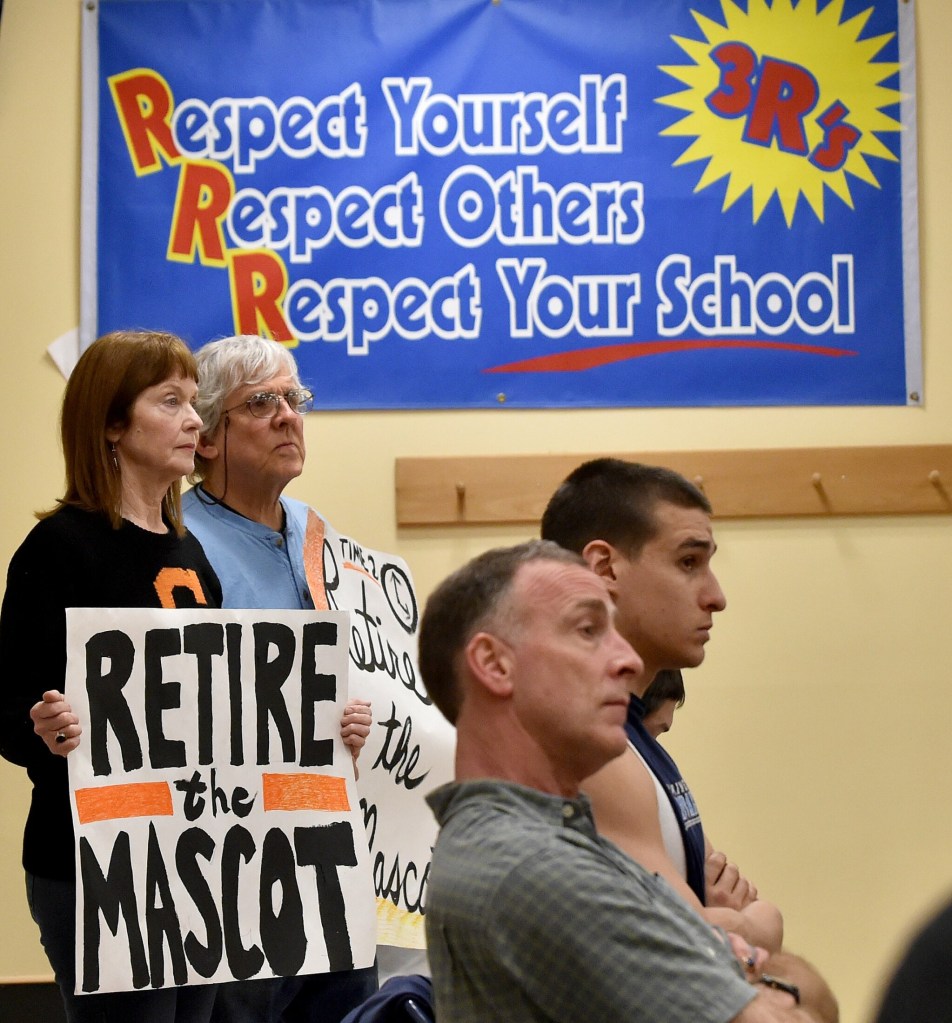Maine’s Department of Education on Friday urged schools “to refrain from using mascots and logos that depict Native American tribes, individuals, customs, or traditions,” a move that comes a week before the Skowhegan area school board is scheduled to deliberate further over their schools’ “Indians” nickname.
The department, in a priority notice, noted that it does not have jurisdiction over such local decisions, but it is encouraging schools and communities “to consider the impact of promoting symbols and stereotypes that marginalize individuals or groups of people.”
Skowhegan Area High School, whose teams use the “Indians” moniker, is the last public high school in Maine to use Native American images or nicknames for its sports teams.
“The DOE is working to enhance our office of Student Supports with additional staff and resources to assist Maine schools and districts in the development and strengthening of practices that promote cultural competence and reduce bias and inequity,” the department said.
Directors of Skowhegan-based School Administrative District 54 are scheduled on March 7 to exchange their thoughts on what’s next for the Skowhegan “Indian” nickname used by high school sports teams. Use of the nickname “Indians” for Skowhegan Area High School sports teams has its supporters and its detractors, and debate has raged for nearly four years with no solution.
Defenders of the use of the Native American nickname are steadfast in their belief that the actual mascots were retired long ago and that the name “Indians” is a way of honoring the strength and prowess of American Indians who lived along the banks of the Kennebec River for centuries.
But many actual Native Americans say it is racist and demeaning to them and want the mascot gone.
Gov. Janet Mills has asked SAD 54 officials to consider the feelings of Native Americans in making a decision about the mascot.
Dixie Ring, of Canaan, chairwoman of the SAD 54 board of directors, said Friday that she agrees with the DOE stance on use of Native American imagery and nicknames. She said she favors retiring the Skowhegan “Indians” mascot.
Ring said the DOE statement Friday did not sway her vote because she was already on board with changing the name.
“No,” she said. “I changed my mind before.”
Asked if the DOE message will have any effect on next week’s workshop and possible school board vote, Ring said she was uncertain.
“I’m really not sure if it will,” she said. “This board tends to make up its own mind, which I respect them for. As far as a vote, I think there needs to be something done; but again, there are board members who see it differently, and we all have to respect each other’s opinions.”
Citing a resolution by the American Psychological Association and a research report compiled by Michael A. Friedman, Ph.D., titled “The Harmful Psychological Effects of the Washington Football Mascot,” the state DOE concluded Friday that it was time for Maine schools to give up the Native American mascots and logos.
“Many American Indians report that they find today’s typical portrayal of American Indian culture disrespectful and offensive to their spiritual beliefs,” the APA writes in its resolution, which was linked to the DOE release Friday. “Such mascots are a contemporary example of prejudice by the dominant culture against racial and ethnic minority groups.”
In 2005, the APA called for the immediate retirement of all American Indian mascots, symbols, images and personalities by schools, colleges, universities, athletic teams and organizations.
“APA’s position is based on a growing body of social science literature that shows the harmful effects of racial stereotyping and inaccurate racial portrayals, including the particularly harmful effects of American Indian sports mascots on the social identity development and self-esteem of American Indian young people,” the report reads.
Research has shown that the continued use of American Indian mascots, symbols, images and personalities has a negative effect on not only American Indian students but all students.
“This report presents the scientific rationale for the position that the Washington football team’s ‘R-word’ mascot is harmful to the Native American population and should therefore be changed,” Michael A. Friedman writes in his report, commissioned by the Oneida Indian Nation.
“The simplest way to try to dismiss this issue is by insisting that the team’s use of this slur is a victimless crime, or merely an issue of political correctness about which people can have differing views,” he writes. “However, the ongoing use of a dictionary-defined racial slur above the repeated objections of the Native American community poses serious risk for negative mental health consequences to Native Americans.”
Maulian Dana, ambassador of the Penobscot Nation and founder of the Not Your Mascot, Maine Chapter, Facebook group, said she is thrilled with the DOE announcement, which reiterates what she has been saying all along.
“I am very pleased with this news,” Dana said. “We’ve been working for a long time to get someone in the state educational sector to take a stand on this for the students and indigenous people of Maine. It stops being about local control when the local board refuses to do the right thing, as we saw in 2015. I hope that this helps in the current board’s decision.”
Jennifer Poirier, a school board member and founder of a closed Facebook group called Skowhegan Indian Pride, maintained her position, saying they use the name out of respect.
“Skowhegan removed the mascot years ago,” Poirier said Friday.
The Fryberg report used in the APA declaration clearly states a difference between mascots and logos, Poirier said, citing a report by Stephanie Fryberg, Ph.D., of the University of Arizona.
“She states that ‘mascots are not inherently harmful’ and they do not have a ‘causal’ impact,” Poirier said, although Fryberg is quoted in a summary of the APA resolution recommending retirement of American Indian mascots that American Indian mascots are “harmful.”
Poiriere said the Fryberg report creates more questions than answers.
“Preliminary reports show that MSAD 54 students who identify as Native American actually perform better academically than other students,” she said. “The Skowhegan Indian name and logo are not showing negative impacts in our district. I appreciate that the Maine DOE recognizes local control.”
Pride members have said all along that the nickname is not a sports mascot and that all of the cartoon imagery, feathers and warpaint was dropped years ago at the request of Maine Native Americans. Many also say it is an important school tradition.
Two staunch supporters of keeping the “Indians” name, board members Lynda Quinn and Harold Bigelow, could not be reached Friday for comment.
Brent Colbry, superintendent of SAD 54, said Friday that the school board is open to opinions from other entities.
“I’m certain that the board will welcome the input from the DOE regarding this very important discussion,” Colbry said in an email to the Morning Sentinel. “The board has welcomed input from a wide variety of groups and individuals over the past few months. I know they welcome the department’s interest and guidance as the board considers what action it may take regarding this extremely complex community issue.”
Rachel Paling, director of communications at the DOE, said she was unable to find out Friday if the statement on school mascots was the first time that the department had taken such a stance.
The DOE release Friday comes after a letter sent in December to Ring and Colbry from the staff attorney for the American Civil Liberties Union of Maine, urging them to “do the right thing” and drop the “Indians” nickname. That attorney, Zack Heiden, was present Thursday night for the school board meeting.
Heiden stood to tell the board that there once were nine school districts in Maine with Indian mascots or nicknames. Now there is just one — Skowhegan. He said if the district ends up in court, it is going be costly.
“I’m here tonight to ask you to retire the mascot,” Heiden told the board.
The chairman of the Episcopal Committee on Indian Relations also wrote a letter to the SAD 54 board, asking the district to discontinue the use of “Indians” as the Skowhegan Area High School mascot.
The church was echoing the Bangor chapter of the NAACP, which in 2015 asked the district to drop the nickname.
Doug Harlow — 612-2367
dharlow@centralmaine.com
Twitter:@Doug_Harlow
Comments are not available on this story.
Send questions/comments to the editors.





